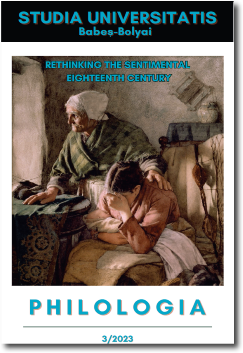AGGRESSION, SUFFERING, AND AFFECTIVE DEVELOPMENT IN ELIZA HAYWOOD’S THE HISTORY OF MISS BETSY THOUGHTLESS
DOI:
https://doi.org/10.24193/subbphilo.2023.3.04Keywords:
Eliza Haywood, The History of Miss Betsy Thoughtless, sights of suffering, aggression, affective development, sentimental fiction, the eighteenth-century novel.Abstract
Aggression, Suffering, and Affective Development in Eliza Haywood’s The History of Miss Betsy Thoughtless. Published during a period of transition from “the epistemological or cognitive” to the “affective dimension of fiction”, to use Catherine Gallagher’s conceptualization of the progress of the mid-eighteenth-century novel, The History of Miss Betsy Thoughtless is often read as a story of development from “thoughtless coquette” to “thoughtful wife”. With these two social roles in the background, this paper sets forth to examine the affective and emotional development of Betsy Thoughtless through a close reading of her reactions to scenes of suffering and forms of aggression. The claim of the paper is that Miss Betsy’s history progresses as her empathy and capacity to internalize potentially traumatic events grow, which invites sympathetic identification.
REZUMAT. Agresiune, suferință și maturizare afectivă în romanul The History of Miss Betsy Thoughtless de Eliza Haywood. Publicat în timpul unei perioade de tranziție de la dimensiunea „epistemologică sau cognitivă” la „dimensiunea afectivă a ficțiunii” – ca să împrumutăm terminologia utilizată de Catherine Gallagher pentru conceptualizarea schimbărilor din evoluția romanului modern la mijlocul secolului al XVIII-lea –The History of Miss Betsy Thoughtless este adeseori citit ca roman al devenirii, care urmărește progresul eroinei de la „cochetă necugetată” la „soție grijulie”. Păstrând aceste două roluri în fundal, acest articol își propune să examineze dezvoltarea afectivă și emoțională a lui Betsy Thoughtless printr-o citire atentă a reacțiilor acesteia la scene de suferință și diverse forme de agresiune. Lucrarea susține că istoria domnișoarei Betsy avansează o dată cu dezvoltarea empatiei și a capacității sale de a interioriza evenimente cu potențial traumatic, ceea ce invită identificarea afectivă din partea cititorului.
Cuvinte-cheie: Eliza Haywood, The History of Miss Betsy Thoughtless, scene de suferință, agresiune, dezvoltare afectivă, ficțiune sentimentală, romanul secolului al XVIII-lea.
Article history: Received 7 June 2023; Revised 21 August 2023; Accepted 11 September 2023;Available online 30 September 2023; Available print 30 September 2023
References
Austin, Andrea. 2000. "Shooting Blanks: Potency, Parody, and Eliza Haywoody's The History of Miss Betsy Thoughtless." In The Passionate Fictions of Eliza Haywood, edited by Kristen T. Saxton and Rebecca Bocchicchio P., 325-54. The University Press of Kentuky.
Ballaster, Ros. 2000. "The Gender of Opposition. Eliza Haywood's Scandal Fiction." In The Passionate Fictions of Eliza Haywood. Imitation and Adaptation, edited by Kristen T. Saxton and Rebecca P. Bocchicchio, 183-213. Lexington: The University Press of Kentuky.
Csengei, Ildiko. 2012. Sympathy, Sensibility and the Literature of Feeling in the Eighteenth Century. Palgrave Macmillan.
Davis, Lennard. 1983. Factual Fictions: The Origins of the English Novel. New York: Columbia University Press.
Gallagher, Catherine. 1999. "Nobody’s Story: Gender, Property, and the Rise of the Novel." In Eighteenth-Century Literary History, edited by Marshall Brown, 27-42. Duke University Press.
Haywood, Eliza. 1999. Selections from The Female Spectator. Edited by Patricia Meyer Spacks. Oxford: Oxford University Press.
Haywood, Eliza. [1751] 1998. The History of Miss Betsy Thoughtless. Toronto: Broadview Literary Texts.
Haywood, Eliza. [1725] 2004. "The Tea-Table: or, A Conversation between Some Polite Persons of Both Sexes." In Fantomina and Other Works, by Eliza Haywood, edited by Alexander Pettit, Margaret Case Croskery and Anna C. Patchias, 73-106. Ontario: Broadview.
Johnson, Samuel. [1750] 2011. "Rambler, 4, Saturday, March 31, 1750." In Novel and Romance 1700-1800. A Documentary Record, edited by Ioan Williams, 142-46. London: Routledge.
McGuire, Kelly. 2006. "Mourning and Material Culture in Eliza Haywood's The History of Miss Betsy Thoughtless." Eighteenth Century Fiction 18 (3): 281-304.
McKeon, Michael. 2002. The Origins of the English Novel, 1600-1740. 2nd. Baltimore and London: The John Hopkins University Press.
Reeve, Clara. [1785] 1970. The Progress of Romance Through Times, Countries, and Manners. Indiana: Garland.
Richetti, John. 2000. "Histories by Eliza Haywood and Henry Fielding." In The Passionate Fictions of Eliza Haywood. Imitation and Adaptation, edited by Saxton Kristen T. and Rebecca P. Bocchicchio, 302-25. Lexington: The University Press of Kentuky.
Richetti, John. 2005. The English Novel in History 1700-1780. London and New York: Routledge.
Richter, David H. 2016. "The Gothic Novel and the Lingering Appeal of Romance." In The Oxford Handbook of the Eighteenth-Century Novel, edited by J. A. J Downie, 472-88. Oxford: Oxford University Press.
Sill, Geoffrey. 2016. "Developments in Sentimental Fiction." In The Oxford Handbook of the Eighteenth-Century Novel, edited by J. A. J. Downie, 426-39. Oxford: Oxford University Press.
Sitter, John. 1982. Literary Loneliness in Mid-eighteenth-century England. Ithaca and London: Cornell University Press.
Stuart, Shea. 2002. "Subversive Didacticism in Eliza Haywood’s ‘Betsy Thoughtless’." Studies in English Literature, 1500-1900 42 (3): 559–75. http://www.jstor.org/stable/1556180.
Tierney-Hynes, Rebecca. 2012. Novel Minds. Philosophers and Romance Readers, 1680-1740. Palgrave Macmillan.
Van Sant, Ann Jessie. 1993. Eighteenth-Century Sensibility and the Novel. Cambridge: Cambridge University Press.
Downloads
Published
How to Cite
Issue
Section
License
Copyright (c) 2023 Studia Universitatis Babeș-Bolyai Philologia

This work is licensed under a Creative Commons Attribution-NonCommercial-NoDerivatives 4.0 International License.



